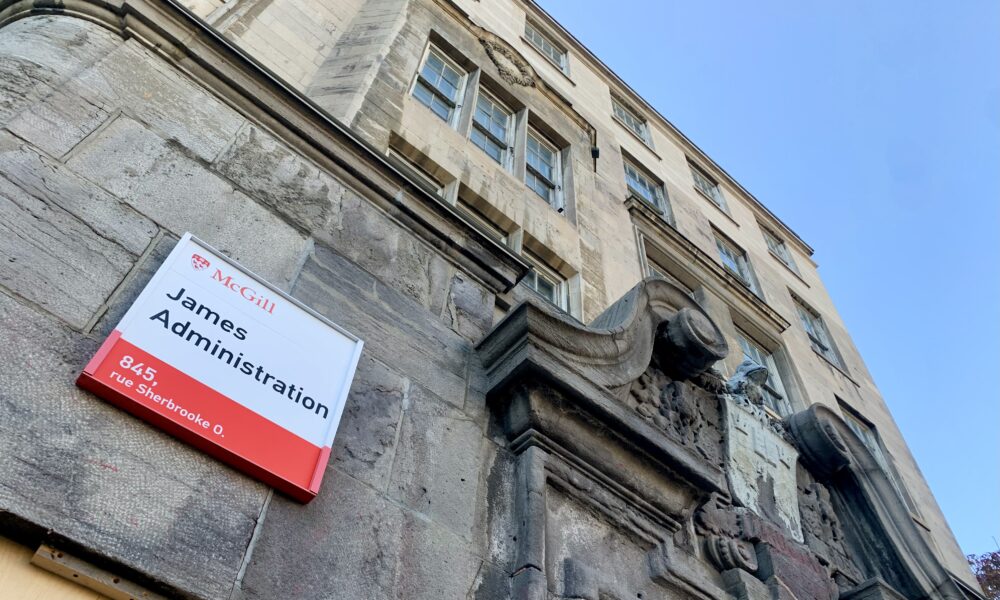McGill’s policy on controversial speaker events, the university’s projected $45 million CAD deficit for fiscal year 2026, and the school’s fundraising standing were among the topics of discussion at the university Senate’s final meeting of the calendar year on Dec. 4.
The meeting commenced with two memorial tributes to the late Professor Philip E. Branton of the Faculty of Medicine and Health Sciences and Professor Jon Bradley in the Faculty of Education.
The Senate moved to discuss the policy on speaker events after a Nov. 25 directive paused invitations for in-person extracurricular events until Jan. 1. This policy came in the wake of outcry at McGill’s decision to host Mosab Hassan Yousef for a talk, who students denounced for his past Islamophobic and anti-Palestinian remarks. This controversy over a speaker—an issue not unique to McGill—prompted Senators to question the decision-making process, expressing concerns about the lack of transparency and consultation with academics and students.
Interim Deputy Provost (Student Life & Learning) Angela Campbell explained the decision followed a death threat, and provided no further information. She acknowledged the difficulty in managing the situation, emphasizing the need for community consultation.
“Between now and Jan. 1, when this pause ends, a process will have to be put in place whereby this community decides whether or not we say no to particular speakers. Senate was invited to comment on that last month, it did not,” Campbell explained.
While Campbell suggested that some individuals have pointed to hate speech as a potential boundary for rejecting speakers, she stressed that the topic requires further discussion.
Senator Victor Muñiz-Fraticelli replied, stating that the Senate engaged in an open discussion on the topic earlier in the month. However, Campbell clarified that no final decisions or policy was established detailing the university’s response to hosting controversial speakers. Faculty of Medicine and Health Sciences Dean Lesley Fellows concluded the discussion in the interest of time, highlighting its significance and suggesting that it will continue in the future.
The meeting turned to Provost and Executive Vice-President (Academic) Christopher Manfredi, who presented the budget planning report for 2025-26 and revealed a projected deficit of $45 million CAD for the 2026 fiscal year. Looking to the future, Manfredi attributed this deficit to an estimated 2 per cent annual increase in revenue juxtaposed with a 3.5 to 4 per cent annual increase in expenses for fiscal years 2026 to 2028. Several factors are contributing to the financial challenges: Declining international student enrolment, loss of revenue due to tuition policy changes for out-of-province undergraduate students, costs associated with the Canada Awards program to maintain enrolment levels, and uncertainty surrounding the provincial government’s proposed Bill 74 and the Dubreuil report.
Bill 74 seeks to limit international student recruitment and impact graduate programs, and the Dubreuil report proposes capping anglophone university enrollment at 15 per cent or requiring 85 per cent of instruction to be in French. Manfredi underscored that both could severely affect McGill and Concordia’s future enrollment.
“I think there is a unanimous agreement among all Quebec universities that this would not be a good thing for Quebec,” Manfredi said. “I want to assure members of Senate that there’s significant engagement with the government, both with our stakeholders who are outside the university sector, but also in collaboration with other Quebec universities.”
Next, Associate Vice-President (Financial Services) Christiane Tinmouth presented an overview of the university’s financial state for the 2024 fiscal year, noting a surplus of $78 million CAD in the operating fund, primarily due to a favourable pension remeasurement gain. She detailed the breakdown of revenues and expenses, noting the operating fund surplus was achieved on a Generally Accepted Accounting Principles (GAAP) basis.
Concluding the meeting, Vice-President (University Advancement) Marc Weinstein presented a report on fundraising. He announced the Made by McGill: The Campaign for Our Third Century had surpassed $2 billion CAD ahead of schedule. The campaign, launched in 2019, has funded almost 5,000 projects across the university with donations from over 113,000 donors in 132 countries.
“We are trying to optimize our fundraising efforts to better support the emerging priorities of the university. We are reorganizing advancement as we speak, and our goal is to better support McGill philanthropically by re-working our operation, both centrally and in faculty,” Weinstein said.
Moment of the meeting:
Manfredi stressed that the decline in international student enrollment is particularly concerning as they pay significantly higher tuition fees than domestic students. Additionally, the Quebec government’s tuition policy changes have resulted in a $5,000 CAD per student revenue loss for each international student. These factors combined have created a significant financial strain on McGill.
Soundbite:
“[There is] a concern about thinking there was a lack of transparency, and wondering if there could be some way of consulting academics and students to be included when important decisions are made like this […] having designated academics and students that could be included when important decisions are made about this.” — Faculty of Dental Medicine and Oral Health Sciences Senator Alissa Levine on the directive of the Nov. 25 email and the implications of a future speaker policy.









